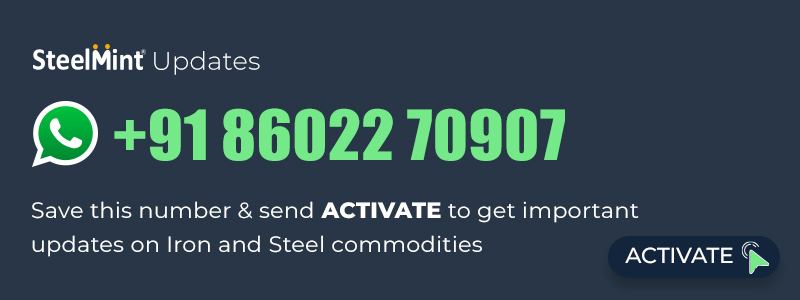Five reasons why Indian mills may not resume booking imported scrap soon
Indian mills may not return to the imported scrap market very soon, although the expectation was, they would resume booking from the third or fourth week of August. Impor...

Indian mills may not return to the imported scrap market very soon, although the expectation was, they would resume booking from the third or fourth week of August. Imported scrap bookings in the last one month have continued to remain dull despite global prices of the material witnessing a fall, especially because of a fall in Turkey imported scrap prices.
In fact, data maintained with SteelMint reveals that ferrous scrap imports have fallen from a high of 4.85 lakh tonnes in Dec'20 to 2.88 lakh tonnes in May'21, 3.35 lakh tonnes in Jun'21 and 2.76 lakh tonnes in Jul'21.

Why are mills still shying away from the imported market?
1. High disparity between domestic prices versus landed cost of imports: Mills are waiting for price corrections before they resume booking but freights are high which may not allow further downward correction. Only sporadic lower priced deals are happening. The imported price of good quality HMS scrap, at $475-490/t CFR Nhava Sheva, for which landed cost is INR 37,000-38,000/t . In contrast, domestic scrap is at around INR 34,000/t exy Mum. With domestic sponge iron prices even lower at INR 29,500-30,000/t.

2. With falling iron ore and pellet prices, sponge prices may come under pressure: Iron ore/pellet prices have corrected around 25% in the last two months. This may reduce sponge production costs and prices. SteelMint's benchmark sponge iron P-DRI (FeM 80%) prices dropped INR 900/t ex-w-Raipur to INR 29,700/t on 27 Aug'21. "Sponge and domestic scrap prices witnessed a decline last week, so these two continue to remain to be preferred by Indian mills. Some are expecting to restart booking from September. This is a possibility, provided prices correct further," said a source. At the same time, others say, because of the higher freight rates, prospects of imported prices falling are unlikely.
3. Neighbouring countries are paying a better price: Imported prices are more driven by consumption in neighbouring Pakistan and Bangladesh, which are ready to pay higher. Container freights are high and not likely to drop soon which will support the high imported scrap prices.
In fact, the high vessel freights are forcing mills to stick to containerized trade. In shredded, Pakistan buyers, eager to pay higher, maintained a lead. Bangladesh is not booking bulk because of bid-offer disparities and being active in containers. Both Bangladesh and Pakistan are paying better for shredded, forcing sellers not to offer good volumes to Indian mills either.

4. Indian steel exports (especially longs/semis) look bleak in coming months: Indian exports look bleak for Sept'21. In case exports do not pick up, domestic allocations will increase which will put steel prices under pressure. Secondary mills are also operating at a lower capacity. So too much raw materials are not needed at present.
5. Scrap prices in global markets not expected to fall soon: Domestic steel prices are still high in the US and Europe. Turkey is unlikely to cut scrap prices very sharply unless its finished steel sales remain subdued.
Factors to look out for
China's production cuts and rising Covid cases in South East Asian countries like Vietnam and Indonesia, on the other hand, will reduce scrap consumption. Domestic scrap prices have already declined in China.
However, high freights may keep imported ferrous scrap prices supported in the near term.




